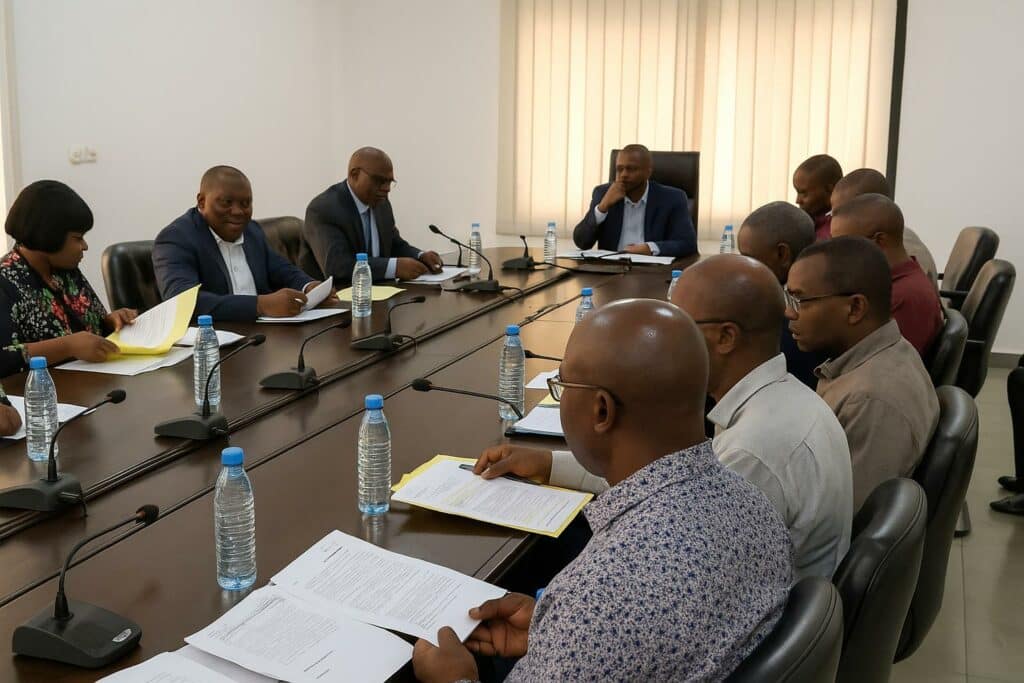Executive Committee aligns the roadmap
Under the vaulted ceilings of the federation’s headquarters on 2 October, the Congolese Football Federation (FECOFOOT) convened an extended session of its Executive Committee as a prelude to the ordinary General Assembly scheduled for 4 October in Brazzaville. President Jean Guy Blaise Mayolas opened the proceedings by insisting on “rigorous organisation” and “responsible deliberation”, framing the preparatory meeting as a pivotal step toward a congress that must, in his words, be “dignified, constructive and a bearer of hope for the sustainable development of our football” (FECOFOOT communiqué, 2 Oct.).
Participants reviewed the state of completion of all statutory documents—administrative reports, technical assessments, draft budgets and compliance certificates—required for adoption by the forthcoming assembly. According to internal sources, over 90 per cent of the files had already passed through the federation’s audit and legal units, leaving only minor linguistic harmonisations to be finalised before distribution to delegates.
Key appointments reinforce institutional stability
Mindful of maintaining the full complement of its governance organs, the Executive Committee also ratified three co-options to fill vacancies created by departures earlier this year. Lucienne Virginie Mokoko, a seasoned sport administrator and former chair of FECOFOOT’s women’s football commission, was elevated to one of the vice-presidential seats. Eudes Eric Mouandhat, known for his stewardship of regional academies, becomes vice-president, while Hyppolite Okondzi Kongolo, a financial compliance specialist, joins as an ordinary member. Their mandates will be submitted for formal endorsement by the General Assembly, in accordance with the federation’s statutes revised in 2021.
Observers note that the promotion of Ms Mokoko, the first woman to occupy such a senior post since 2014, aligns with the broader continental push for gender inclusion championed by CAF. Her appointment has been cautiously welcomed by club presidents, who see in her administrative rigour a potential counterweight to entrenched rivalries.
Strategic priorities on the Brazzaville agenda
Beyond the procedural business, sources close to the secretariat indicate that the Brazzaville assembly will debate three strategic themes: consolidation of youth development pathways, enhancement of club licensing standards and digital modernisation of competition management. A draft strategy proposes a phased decentralisation of youth talent centres, moving from five regional hubs to twelve by 2026, in order to widen the scouting net across the departments of the Republic of Congo.
The licensing dossier, developed with technical input from FIFA’s Professional Football Department, envisages stricter criteria on financial disclosure, stadium safety and medical protocols. Officials argue that meeting those benchmarks is indispensable for securing greater visibility of Congolese clubs in continental competitions.
Legal and financial compliance under scrutiny
In the wake of recent governance controversies affecting several African federations, FECOFOOT is keen to project an image of institutional rectitude. The Executive Committee confirmed that the 2022 financial statements have undergone an external audit by the Brazzaville office of KPMG-CEMAC, with an unqualified opinion reportedly issued in early September. A draft amendment to the federation’s code of ethics, introducing explicit whistle-blowing protections, will also be tabled for delegate approval.
Sports-law analyst Maître Alcide Ngoma underscores the significance of these moves: “By tightening its compliance architecture, FECOFOOT not only mitigates litigation risks but also positions itself to attract more corporate sponsorships in an increasingly regulated environment.”
Stakeholder expectations and regional resonance
Club representatives contacted in Pointe-Noire and Dolisie express guarded optimism. Many hope the assembly will lead to a more predictable calendar, thereby reducing travel and lodging costs that have escalated since 2022. The National Union of Footballers of Congo, for its part, intends to lobby for swifter implementation of the forthcoming players’ social security scheme, a measure already endorsed in principle by the Ministry of Sports.
Regionally, neighbouring federations in the CEMAC zone are watching Brazzaville’s reforms with interest. A well-managed congress could reinforce Congo-Brazzaville’s candidacy to host future zonal youth tournaments, strengthening its soft power within Central African football diplomacy.
High stakes for a sport of national cohesion
Football remains a vehicle of social cohesion in Congo-Brazzaville, a sentiment echoed by President Mayolas who reminded committee members that the sport’s popularity imposes a duty of excellence on administrators. With the senior national team aiming to revive its qualifying campaign for the 2025 Africa Cup of Nations, a stable and forward-looking governance framework is widely viewed as a prerequisite.
As delegates prepare to gather on 4 October, the groundwork laid this week suggests a determination to couple institutional discipline with ambition. Should the assembly endorse the proposed reforms and appointments, FECOFOOT will have signalled that its house is in order, ready to channel the passion of millions into tangible, sustainable progress on and off the pitch.

